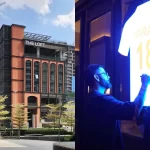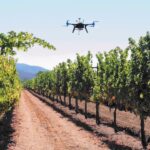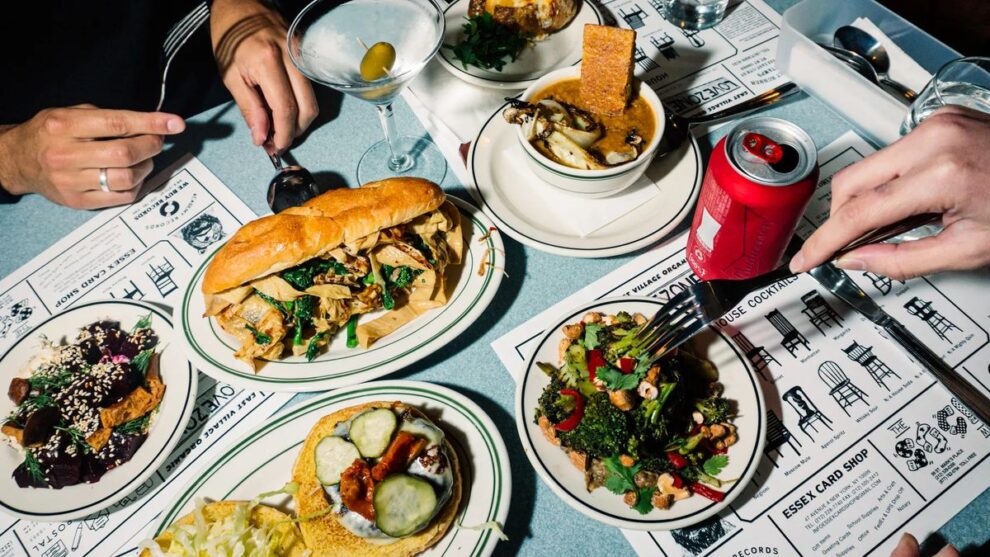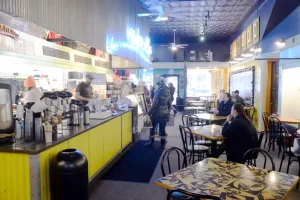Alicia Kennedy’s debut book, “No Meat Required,” is an ode to the city’s lost vegan restaurants
AliciaAlicia Kennedy didn’t enjoy her first vegan restaurant meal in New York. It was the early aughts, and a friend of hers excitedly dragged her to Foodswings, a temple for vegan junk food in Williamsburg. Kennedy, then a teenager, had heard raves about the tofu Buffalo wings there, yet its menu seemed so focused on meat simulacra that the restaurant fell into a strange abyss for her: She ordered a seitan gyro and couldn’t finish it.
:no_upscale()/cdn.vox-cdn.com/uploads/chorus_asset/file/24839656/nomeatrequired.jpg)
Still, Kennedy concedes in her debut book No Meat Required (out this month from Beacon Press), that the restaurant — which shuttered in 2014 — has its significance within the larger narrative of plant-based dining in New York City. It represented a roguish strain of vegan restaurant cooking that’s become increasingly harder to access in recent years.
At fewer than 200 pages, No Meat Required is a brisk manifesto for reducing animal consumption on an increasingly imperiled planet. Among No Meat Required’s most compelling threads is Kennedy’s mapping of the shifting topography of New York’s vegan restaurants. Kennedy — who grew up on Long Island and lived in New York City for years (she is now based in San Juan) — documents the city’s changing appetites in this book, questioning what we may have lost when institutions like Foodswings died.
As my own health has nudged me towards veganism over the past year, Kennedy’s thinking on this very topic — spread across her popular weekly newsletter and her writing for various publications (including Eater), and now crystallized in this book — has made this transition feel less spiritually daunting. Kennedy, a vegetarian, resists wagging her finger at her reader. She understands that some in her audience may be omnivores; that generosity courses through this book.
“When you think about it, New York used to be the host of such an interesting diversity of vegan restaurants in terms of approaches,” Kennedy tells me on a recent call. She identifies two philosophies of vegan dining in the city she once knew: One punkish, the other more hippie-aligned. Foodswings belonged to the former, she says. “It’s about being filled up,” she says of the punk school. “It’s about having nostalgia foods — white American nostalgia foods, usually.” Protein — seitan, tempeh, tofu — was at the fore. This food was loud, even masculine, Kennedy says; it was also affordable.
:no_upscale()/cdn.vox-cdn.com/uploads/chorus_asset/file/24839698/angelica2.jpg) The exterior of Angelica Kitchen. Robert Sietsema/Eater NY
The exterior of Angelica Kitchen. Robert Sietsema/Eater NY
The hippie lineage, meanwhile, was best represented by the prim and pricier Angelica Kitchen, an East Village standby from 1976 until 2017 famous for its bowls of grains, nuts, and greens. “When you’re talking about Angelica, you’re talking about something that is inspired by a more macrobiotic approach,” Kennedy says. Its menu evinced a firm disinterest in meat analogues. Where Foodswings may have sated with its nostalgia-greased menu, Kennedy says, you could very well leave Angelica Kitchen feeling hungry. Put another way, Foodswings was low culture, Angelica high.
These restaurants belonged to a larger constellation of vegan establishments, Kennedy says. On occasion, you’d find one that miraculously bridged these high and low camps, such as the food truck the Cinnamon Snail, whose maple mustard tempeh sandwich struck her as both filling and artfully conceived. But the Cinnamon Snail, which closed in 2020, is part of a graveyard of now-defunct vegan businesses that once dotted the city. The raw vegan restaurant Pure Food and Wine, whose owner was the subject of the 2022 Netflix docuseries Bad Vegan, closed in 2015; Jivamuktea Cafe near Union Square shut its doors in 2019. There was “this really high-low difference between all these places,” Kennedy says, “that kind of now is gone.” (The landscape is in such flux that a few other names Kennedy mentions in the book — Brooklyn’s Champs Diner, Manhattan’s Lekka Burger, the Bronx’s Vegan’s Delight — have ceased operations since the book went to print.)
:no_upscale()/cdn.vox-cdn.com/uploads/chorus_asset/file/24839691/dirtcandy.jpg) The inside of Dirt Candy on the Lower East Side. Daniel Krieger/Eater NY
The inside of Dirt Candy on the Lower East Side. Daniel Krieger/Eater NY
Though a few vestiges of that earlier era remain — Caravan of Dreams in the East Village, which bills itself as the city’s oldest organic vegan restaurant, has operated since 1991 — this spate of high-profile closures has led to a welcome changing of the guard, in Kennedy’s view. The cookbook author and restaurateur Isa Chandra Moskowitz’s comfort food spot Modern Love, open since 2016 in Williamsburg, reconciles that high-low chasm that once seemed so stark to Kennedy. (Indeed, Moskowitz’s 2005 cookbook Vegan with a Vengeance, which traced her own anarchist-leaning roots in relation to her veganism, began to narrow that gap; her restaurant, where a vegetable-forward “Goddess Bowl” with grilled tofu sits next to a Philly cheesesteak made from shaved seitan and cashew queso, represents both worlds.) What’s more is that vegan dining has attained a social cachet that it didn’t quite have when Kennedy first came to the city years ago, epitomized by such restaurants as the sleek Ras Plant Based, an Ethiopian restaurant with locations in Brooklyn and Manhattan.
“It’s a little bit sexier,” Kennedy says of vegan dining in the city today. “It’s a little bit more polished now, the landscape, in terms of both the food and the aesthetics. You’re not going to find a dingy hole in the wall where someone is serving you the old-school tofu wings anymore.”
:no_upscale()/cdn.vox-cdn.com/uploads/chorus_asset/file/24839689/abcv.jpg) The inside of ABCv from Jean-Georges Vongerichten. Eater NY
The inside of ABCv from Jean-Georges Vongerichten. Eater NY
She also notes that vegetarian restaurants like Amanda Cohen’s Dirt Candy, Brooks Headley’s Superiority Burger, and Jean-Georges Vongerichten’s abcV have also helped make vegan and vegetarian cooking more legible to the general public. “If you’re not vegan and vegetarian, you still want to eat at those places,” she says. There are trade-offs to this sway in public sentiment, Kennedy notes. She misses some of “in-groupiness,” as she puts it, that came with knowing about those bygone vegan restaurants. This mainstreaming of plant-based eating, too, may have sanded off the sharper edges that those community-minded spots represented in their rejection of an individualistic approach to consumption.
In No Meat Required, Kennedy urges her reader to remember these radical roots as vegan eating becomes more normalized, a development she sees as a net positive. Indeed, the current array of vegan restaurants in New York — Jajaja, PLANTA, Spicy Moon — seems boundless from where I’m sitting. This reality gives Kennedy’s argument in No Meat Required even greater resonance. The book is not a lament but a plea filled with hope that eaters can see abundance rather than limitation in a meatless future.
Source : Eater
































